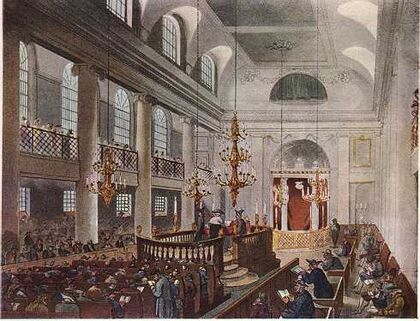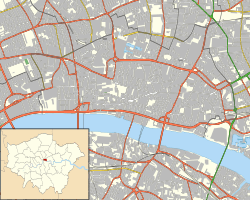Great Synagogue of London facts for kids
Quick facts for kids Great Synagogue of London |
|
|---|---|

The Great Synagogue in 1809
(from Ackerman's Microcosm of London) |
|
| Religion | |
| Affiliation | Orthodox Judaism (former) |
| Rite | Nusach Ashkenaz |
| Ecclesiastical or organisational status | Synagogue (1790–1941) |
| Status | Destroyed (during WWII) |
| Location | |
| Location | Dukes Place, City of London, England EC3 |
| Architecture | |
| Architect(s) |
|
| Architectural type | Synagogue architecture |
| Founder | Benjamin Levy |
| Funded by |
|
| Date established | c. 1690 |
| Completed | 1722; 1790; and 1852 |
| Destroyed | 11 May 1941 |
The Great Synagogue of London was an important Jewish place of worship in London, England. It was a central part of Ashkenazi Jewish life in the city for many years. The synagogue was first built in the 1600s. Sadly, it was destroyed during World War II in 1941.
Contents
History of the Great Synagogue
The first Ashkenazi synagogue in London was built around 1690. It was located in Duke's Place, in the City of London. This was after Jewish people were allowed to return to England in the 1600s.
Building the Synagogue
As the Jewish community grew, a new synagogue was needed. In 1722, a larger building was constructed. A wealthy businessman named Moses Hart paid for it. The cost was about £2,000, which was a lot of money back then! This new building opened on September 18, 1722.
The synagogue became even bigger in 1766. George Dance the Elder, a famous architect, designed this expanded building. It was officially opened on August 29, 1766. This was the first time the building was clearly called 'The Great Synagogue'.
Between 1788 and 1790, the synagogue was rebuilt for a third time. What was special about this project was that a woman, Judith Levy, was the main donor. She was Moses Hart's daughter and gave £4,000. The architect for this grand building was James Spiller. The synagogue was later updated in 1832 and 1852.
Royal Visits and Destruction
In 1809, three sons of King George III visited the Great Synagogue. These were the Royal Dukes of Cambridge, Cumberland, and Sussex. They sat on special chairs and watched the religious service. The writer Leigh Hunt also visited the synagogue when he was a schoolboy. He enjoyed the beautiful singing and the service.
Sadly, the Great Synagogue was destroyed during World War II. It happened on the night of May 10-11, 1941. This was during one of the last big air raids on London, known as the Blitz. Today, a plaque marks the spot where the synagogue once stood in Duke's Place.
People Who Led the Synagogue
The Great Synagogue had many important leaders. These included rabbis and cantors.
Rabbis of the Synagogue
A rabbi is a Jewish religious leader and teacher. Many respected rabbis led the Great Synagogue over its history. One of the most well-known was Aaron Hart, who served for over 50 years (from around 1704 to 1756). Later, Solomon Hirschell was the rabbi for 40 years (1802-1842). The last rabbi mentioned was Joseph Hertz, who served from 1913 to 1946.
Cantors and Music
A hazzan or cantor is a person who leads the congregation in prayer through song. Myer Lyon was a famous cantor at the Great Synagogue starting in 1767. He was so good that he also sang opera at the Covent Garden Theatre! Many non-Jewish visitors came to hear him sing. A Methodist minister named Thomas Olivers even used Myer Lyon's singing of a prayer called Yigdal to create a Christian hymn.
Another important musical figure was Julius Mombach. He joined the synagogue in 1827 as a choirboy. He later became the choir master, leading the synagogue's music until his death in 1880.
The Synagogue in Art
In 1819, a picture of the synagogue's inside was made by Augustus Charles Pugin and Thomas Rowlandson. It was published in a popular magazine. Pugin drew the beautiful columns and decorations of the building. Rowlandson added drawings of the people attending the service.
Images for kids
See also
 In Spanish: Gran Sinagoga de Londres para niños
In Spanish: Gran Sinagoga de Londres para niños
- History of the Jews in England
- List of former synagogues in the United Kingdom
- List of demolished buildings and structures in London
 | Isaac Myers |
 | D. Hamilton Jackson |
 | A. Philip Randolph |





